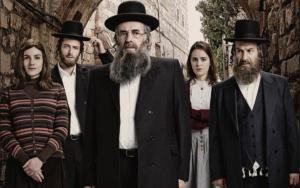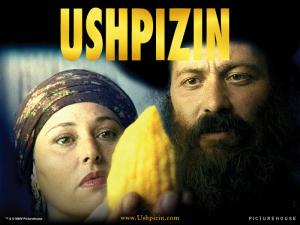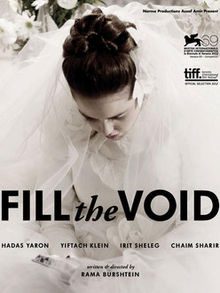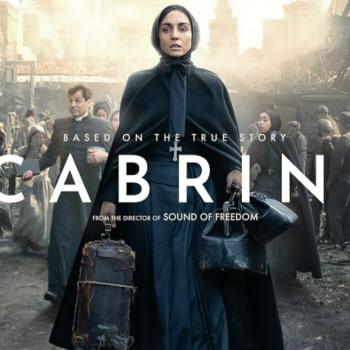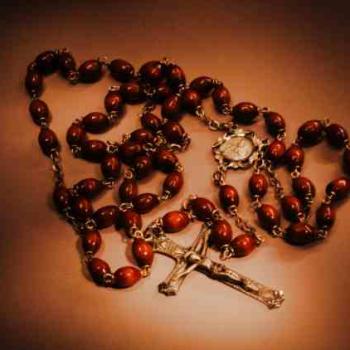With the huge success of Netflix’s three season series “Shtisel” there is growing interest in seeing more films and television series about the Ultra Orthodox Jews who live in Israel, the US and other countries, according to new friends I discovered on the Facebook Group page “Shtisel Addicts.”
I am blessed to count among my friends an Ultra Orthodox rabbi and his wife. I have been to their home a few times for Shabbos and once for Succoth. Each time I learn so much from them, from the rituals (from which the Mass derives), and the kind of lectio divina the family and friends do at the end of the meal. Did you know that there are readings from the Torah (the first five books of the Hebrew Scriptures; for Christians, the Old Testament) for each week of the year that families discuss at the end of the Shabbos dinner?
In September of 2019 three of the sisters in my community, including me, began taking Hebrew lessons from a good friend of ours. Alas, with the pandemic we had to discontinue classes. I admit, I was not the quickest study! Just before the pandemic shutdown, I got to visit Jerusalem and Israel and seeing some of these places I visited or saw in these shows, is very cool. Now, listening to the Hebrew in these films and series, I am hearing words and learning new ones. There are people in our Facebook group who explain the meanings of words and rituals, and I find this information profoundly interesting and inspiring. If you have a question ask and it will be answered.
To me, learning more about cultures through superb storytelling is an invitation to an attitude of respect and community.
You may ask if the Ultra Orthodox can see these films themselves. They do not have televisions in their homes but many now have computers and watch films on DVD. While DVD sales are down everywhere else, I think they may be available in Israel for some time. As for connecting to the Internet and streaming films, this is a controversial issue for the Ultra Orthodox, but as one documentary listed below demonstrates, some are making their peace with it. The Ultra Ultra Orthodox, some of whom we meet in at least one of the films, do not permit access to the Internet. The thing is, access is very tempting. This is where media literacy education could be useful, but I digress.
One thing to pay attention to is the theology expressed in each of these films or series, how the characters view G-d, the Torah, birth, life, death, family, community, justice and religious authority – and how this theology, their understanding of G-d influences their daily lives.
I am using the term “Ultra Orthodox” because my rabbi friend said that this is how he describes his community. I understand that some Jewish people prefer Hassidic or Haredi to describe their communities. I intend no offense.
One lady in the group asked for a list of film and TV titles about Ultra Orthodox Jews so I have created a list of those that I have actually seen along with where you can find them. I came across a new streaming site, “Izzy Stream Israel.com” where there are some interesting Israeli shows, though not all are religious. You can sign up for a month at a time, $5.99.
Please note, all of the films not from the US are in Hebrew, Yiddish, and maybe some English and Arabic. You will have to use subtitles – but it’s worth it.
Here’s my list with a brief description of each.
Shtisel (Israel, three seasons, 2020; Netflix) What can I possibly say about this soap opera-style series that has captured the imagination and hearts of millions in many countries? I love it and when I finished the last episode a couple of weeks ago, I felt like I had lost my best friends. I miss these characters and the series’ heart, humanity, humor, and yes, tragedy and pathos. The story focuses on the Shtisel (pronounced Stish-ill) family, especially the widowed patriarch Rabbi Shulem, his unmarried artist son Akiva, his daughter Giti and her family, and oldest son Avi and his family. To give you an idea of how this series develops, when Grandma Shtisel moves into a retirement home she has a television for the first time in her life as Ultra Orthodox Jews do not have television. She loves it! The stories! When Shulem guilts her about watching TV instead of praying her psalms, she gives it up. When she dies, Shulem finds her prayer list. On it she listed all the troubled soap opera characters she loved to watch. She prayed for them. Ah! There is such fullness of life in this family that lives in what we think is so narrow and limited. Not so. I love this series and commend those who conceived it and created such interesting characters, showing us their inner realities and struggles as well as the challenges of daily life and relationships.
Ushpizin (Israel, 2004; Amazon Prime Video) An older, childless, poor couple prepares to celebrate the feast of Succoth when they are visited by two ex-convicts from the husband’s past. The celebration takes unexpected turns for all. This is one of my favorites.
The Wedding Plan (Israel, 2016; Amazon) From Ultra Orthodox director Rama Burshtein, this is the story of Michal, a young religious woman who owns a traveling zoo. When her fiancé breaks off their wedding at the last minute, Michal believes that G-d will send her a husband by the end of Hanukkah. It’s funny and sweet. I love this film.
Into the Void (Israel; Amazon Prime) In Rama Burshtein’s 2012 film, a young wife, Esther, dies in childbirth , leaving behind an infant son and a husband who is looking for a new wife. Esther’s younger 18 year old sister, Shira, is in the process of becoming engaged. But the matchmaking is called off because Shira’s mother especially wants the girl to marry her now widowed brother-in-law Yochay to make sure the grandson remains nearby. A very moving story about the tangled relationships of love and sacrifice. A beautiful film. Click HERE for my review.
A Price Beyond Rubies (US; 1998, Amazon Prime Video) Sonia is a Hassidic (Ultra Orthodox) married woman in Brooklyn, New York. She feels isolated and unhappy as her husband is very religious and is inattentive towards her. Her problems go deeper, however, and she makes choices that are unwise and wrong to her family and community but perhaps life-saving for her. This is an explicit, fairly raw and challenging film to watch and not appreciated by some Ultra Orthodox who have seen it.
A Stranger Among Us (US, 1992; Amazon Prime Video) Melanie Griffith plays Emily, a NYC detective who is called in when a member of the Hassidic community in Brooklyn goes missing. Once he is found dead in Manhattan’s diamond district where he worked, Emily goes underground with a Rabbi’s family to find the killer. I like this film a lot. I think it is respectful of the Hassidic community as through Emily it teaches us about their lives and beliefs. Plus, it’s a good crime story.
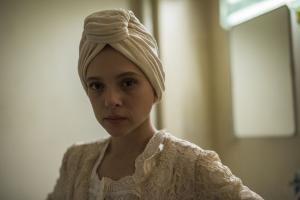
Unorthodox (US, 2020 Netflix) This limited series is based on former Ultra Orthodox (Satmar sect) Deborah Feldman’s 2012 memoir, “Unorthodox: the Scandalous Rejection of my Hasidic Roots.” Starring the luminous Shira Haas as Esther (she is in “Shtisel” too), she literally escapes from her home and marriage to Berlin to find her mother, who had left the community years before. I reviewed Unorthodox for the National Catholic Reporter. I liked it a lot. But I know that Ultra Orthodox viewers may appreciate being warned that there are some explicit marital scenes and brief nudity that are out of place for an observant Ultra Orthodox Jew. You know, we do not find these kinds of scenes in “Shtisel” which makes “Shtisel” an even better series, in my humble opinion. As one member of the Shtisel Addicts Facebook group said, “Sex is a substitute for storytelling.” I thought that a very insightful comment applicable to all entertainment. Still, I watched “Unorthodox” twice. The way it represents marriage in the Satmar orthodox community makes it seem like marriage is only to make babies; that husbands and wives cannot have a personal relationship beyond the bedroom.My review describes the Satmar worldview in more detail.
The Chosen (US, 1981; Amazon Prime Video) Based on the novel by Chaim Potok, two Jewish boys who meet playing baseball in Brooklyn while World War II rages. Reuven is a Modern Orthodox, and Danny is the eldest son of an Ultra Orthodox Hasidic Rabbi and is expected to take his place one day. The film follows both boys as they mature and try to integrate their faith and friendship with the modern world. I quite liked the book and the film.
Fiddler on the Roof (US, 1971; Amazon Prime Video) This fine Broadway musical adapted for the screen hardly needs an introduction. It is 1905 in Anatevka, Ukraine. It is a small town (called a shtetl) of Ultra Orthodox Ashkenazi Jews in Ukraine. Tevye is a poor mailman with three daughters for whom he and his wife must find husbands. As the years go by, times are changing, and each of the daughters makes choices that rock Tevye’s heart and world on one way or another. When outside forces make it impossible for the people to live in Anatevka any longer, they journey on, hoping against hope. The fiddler on the roof is a metaphor for the Jewish people’s survival in Eastern Europe and beyond. This film is one of my favorites.
One of Us (US, 2017, documentary; Netflix) This film follows the struggles of three Satmar sect Ultra Orthodox Jews in New York as they try to leave their extremely rigid and strict Hassidic community. Ari is a young man in rehab in Florida. He knows his father loves him because he has spent so much money to get him clean and sober over the past few years. Ari struggles with the sexual abuse he endured at a religious camp when he was young and wonders about his place in the community back home. Luzer Twersky is an actor. He has left his home, wife and children, to pursue his career in Los Angeles and New York. Etty is a young mother of several children who wants to divorce her abusive husband and the rigidity of their lives. Using a loop hole in New York family law, the Satmar community unites behind the husband to make sure he wins custody of the children with limited contact with Etty. When I spoke to my Rabbi friend who saw the film, he said that it is pretty realistic, unfortunately. Riveting and sad.
Yentl (US, 1983; Amazon Prime Video) The fictional story of a young Jewish woman (played by Barbra Streisand who also directs) in a Polish town whose rabbi father teaches the Talmud (religious law) to her in secret. When he dies, she wants to keep learning, so she disguises herself as a young man and enrolls in a yeshiva where things eventually become very complicated for her and another young student (Mandy Patinkin). I enjoyed the film very much but not sure how the Ultra Orthodox may like it since it is forbidden for women to dress in men’s clothing, especially back in 1904 when the story takes place.
A Quiet Heart (Israel, 2016; Amazon Prime Video; Izzy Stream Israel TV). Naomi is a classical pianist in Tel Aviv who moves to an Ultra Ultra Orthodox section of Jerusalem to get away from the pressures of her life. The rent is cheap but there is an out-of-tune piano in the apartment that an Orthodox neighbor child sneaks in to play. Naomi is accosted and persecuted by Orthodox men who want her out of the neighborhood, and she receives threats in the mail. In all of this she wanders into a Franciscan monastery church one day while someone is playing the organ. She is transfixed. Naomi finds herself at the center of a conflict she never imagined. At first I thought the film was going one way and then it went in another. Ultimately beautiful. It shows that not all Ultra Orthodox Jews are the same and that Jewish women are strong.
Haredim (Israel; Izzy Stream Israel TV) This is a trilogy of separate contemporary documentaries under this title, only available on Stream Israel. Gevald! tells the story of Shmuel-Haim Pappenhym, a “radical Ultra-Orthodox leader” of a sect in Israel that does not accept the state of Israel, and an Ultra-Orthodox member of the Israeli Parliament, Rabbi Avraham Ravitz. As Election Day draws close, Ravitz encourages the people to vote so their interests will be represented in government, but Pappenhym urges people not to vote. The Rabbi’s Daughter and the Midwife tells the story of Adina Bar-Shalom who founds a tertiary college for Haredi Ultra Orthodox women, and Rachel Chalkowski, a midwife and nurse who starts a charity to help very poor Haredi families whose women must work full time and raise very large families in poverty while their husbands study. The women ultimately work together to educate and aid their community. In Religion.com we meet Yoga Revach, an observant Haredi Jew who runs a successful advertising agency in Bnei Brak. It is a city with the most dense population of Ultra Orthodox Jews in Israel and arguably most live in poverty. He wants to bring the Internet to the Haredi community that until now has resisted it completely. However, his research finds that 50% of the community is already on the Internet – the best kept secret in the area. Rabbi Micha Rothschild is a “one-man radical underground movement.” He campaigns vigorously against the invasion of the Internet as he fears that young Haredi men will succumb to the temptations of the outside world.
These contrasting stories offer a larger view of ultra-Orthodox Jewish life in Israel; it is much more complex that most of us could ever imagine even if we have visited Israel.
For a more complete list of movies and series about Ultra-Orthodox Hasidic, Haredi, and Satmar Haredi Jews, visit this site on Wikipedia.


